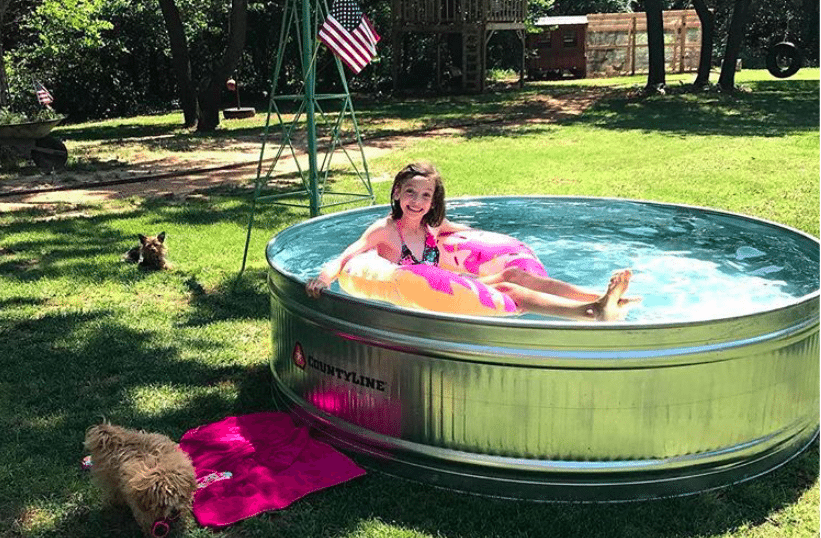How to fix the most common problems with stock tank pools

Have you heard of stock tank pools? They’re pretty much exactly what they sound like: A stock tank, traditionally used as a water trough for livestock, gets repurposed as a backyard swimming pool. They’re affordable, easy to install, can be purchased at your local tractor supply store—and they’re all the rage right now!
But although they might be a lot less hassle than your traditional, in-ground swimming pool, they’re still a lot of work. Here are some of the biggest issues with stock tank pools and how you can fix them (so you can go back to paddling around in your own for the last few weeks of summer).
1. Prevent Slime Build-Up
With water comes microorganisms, and often these microorganisms form algae, or slime. Just because you have a “hillbilly hot tub” doesn’t mean you can just slop a hose in there and let it rip! Even if you can’t see “slime” or algae, it’s probably in your stock tank pool just because it holds standing water. It can cause slippery steps or skin irritation, so it’s important to take care of it. But how? Brettan Hawkins, social media manager at Tractor Supply Company and seasoned stock tank DIYer, recommends getting a small pump and filter or aerator.
“As they transfer and move the stock tank water, they keep the water from getting too hot, prevent algae and other buildup, and prevent mosquitoes from breeding,” Hawkins told CountryLiving.com. “We sell transfer pumps and small aerators, or you can get a true pool filter from a pool store…If the water starts to get mucky for whatever reason, just drain and refill. Our stock tanks come with spigots for easy drainage.”
https://www.instagram.com/p/BVvCG4BFALc/?taken-by=tractorsupply
2. Rust Can Form Easily
This issue is unique to stock tanks, since they’re made of metal. They won’t rust if you fill them with water alone (otherwise that wouldn’t make for a very good drinking source for animals), but the chemicals you use to avoid aforementioned slime can cause rusting.
So, how do you fix this? Instead of just dropping a few chlorine tablets in the pool and hoping for the best, make sure they’re carefully stored inside a chlorine float. This will help prevent the tank from corroding and rusting, Hawkins says. If you’re really serious about this, you can also seal the inside of the tank to prevent rusting.
https://www.instagram.com/p/BG5BmJPKrCA/?taken-by=tractorsupply
3. It Takes Some Serious DIY Skills
Unfortunately, farm supply stores won’t come out and install your new stock tank pool for you. And you absolutely cannot skip the steps of installing a water pump and hose—otherwise, your pool will just be a breeding ground for mosquitos. So, be prepared to cut a lot of holes and custom install a water filter pump, hoses or a tank heater (you never know!).
You can either contract this work out or you can read any of the numerous DIY articles about stock tank pools online. But the great thing is, once you’re done, you’re done!
“Stock tanks are sold in farm stores which are made for farmers,” Frazer Mann, owner of the company Island Hot Tub told Fatherly in an interview. “They’re in the business of having very durable, practical, no frills product. They want something that’s going to work and that’s it. That’s what a stock tank is.”
https://www.instagram.com/p/BUcnDabFPOL/?taken-by=tractorsupply





